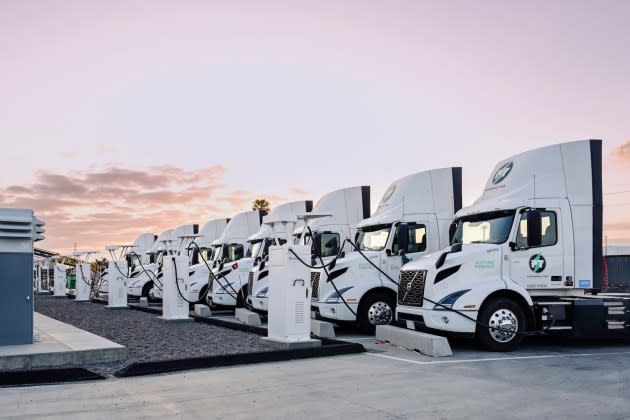Prologis and Maersk Debut EV Truck Charging Hub Near California Ports

Two logistics titans are teaming up to further decarbonize the supply chain with an investment in electric vehicles (EV).
Logistics real estate company Prologis and Maersk’s logistics services subsidiary Performance Team have launched what they call Southern California’s largest heavy-duty EV charging depot, located 20 miles north of the Ports of Los Angeles and Long Beach.
More from Sourcing Journal
Maersk Preps Contingencies for Possible Canadian Rail Strike
Amazon Launches Electrified Drayage Truck Fleet at Port of Los Angeles
Located directly off Interstate 110 in Los Angeles, and within five miles of Interstate 405 and California State Route 91, the Denker Avenue depot can charge up to 96 EV trucks simultaneously.
The debut of the charging station is timed against the backdrop of California’s requirements to end the sale of diesel trucks and move to electric drayage trucks by 2035 and electric heavy-duty trucks by 2045, with more companies investing in charging infrastructure to support operations.
As California continues to push for the expedited adoption of electric trucks, there will be a larger market for charging depots, particularly near transportation hubs. Prologis and Maersk estimate that 20,000 trucks currently serve the ports of Los Angeles and Long Beach.
“It is our ambition to drive the industry shift toward decarbonized supply chains. Expanding the charging infrastructure for commercial electric vehicles is a key part of that,” said Charles van der Steene, regional president for Maersk North America, in a statement. “This facility strengthens our ability to offer customers a decarbonized alternative to conventional trucking and brings us closer to our goal of reaching net zero by 2040.”
Additionally, the move also aligns with Amazon’s recent collaboration with both San Pedro Bay ports, in which the e-commerce giant launched its first heavy-duty electric truck fleet made to transport ocean freight. In that use case, 50 electric drayage trucks will eventually be deployed to haul cargo containers and packages from the ports to Amazon facilities for distribution throughout the region.
Prologis and Performance Team constructed the facility in just five months, the companies said. The amount invested by the parties has not been disclosed.
At the station, Performance Team will be using its fleet of Volvo VNR Electric trucks, which have a range of 240 miles and can charge up to 80 percent in 90 minutes. The company operates over 140 electric vehicles across the U.S.
When developing the Denker charging depot, Prologis installed the charging infrastructure to help speed up the time the project could get online and trucks could get on the road, rather than waiting up to two years for the grid upgrade.
In conjunction with Mainspring Energy, Prologis developed a charging solution to build a microgrid, which is any small network of electrical generators and loads that may be grid-connected but is capable of operating independently of the local grid. The Prologis Denker microgrid uses 2.75 megawatts (MW) of fuel-flexible, hydrogen-ready linear generators paired with 18 megawatt hours of batteries to provide up to nine MW of charging capacity.
“To bring the depot online quickly, we delivered an innovative on-demand charging solution as an interim power connection measure,” said Henrik Holland, global head of Prologis Mobility, in a statement. “The transition to zero emissions is a priority for both companies, and we’re proud to be on this journey together.”
The Denker charging depot is the third Southern California commercial truck EV charging project Prologis Mobility and Performance Team have opened together. Performance Team facilities in Santa Fe Springs and Commerce, equipped with Prologis Mobility charging infrastructure, provide 4 MW of charging capacity—enough to charge 38 electric trucks.
“The future of heavy-duty trucking is pollution-free, and companies in California are leading the way,” said California’s Natural Resources Secretary Wade Crowfoot in a statement. “This public-private partnership to create California’s largest electric truck charging depot will reduce pollution and speed the adoption of electric trucks. In doing so, it helps to build energy independence for our transportation sector. This project is a big step forward and a win-win for our environment and economy.”
